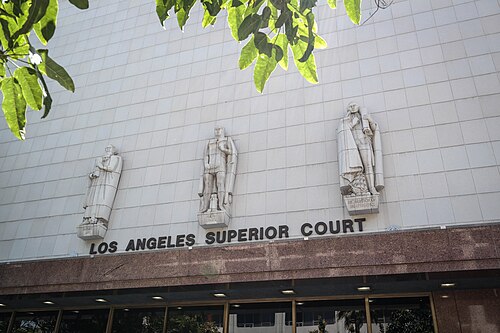Stanley Mosk Courthouse OVerview
Court Address:
The Stanley Mosk Courthouse is located at:
111 N. Hill St., Los Angeles, CA 90012
Phone Number:
For information on criminal, civil, family law, or probate cases, contact the courthouse directly at:
(213) 974-3652
Hours of Operation:
The Stanley Mosk Courthouse is generally open:
Monday through Friday, 8:00 AM to 4:30 PM
Note: Certain departments may operate on varying schedules, so it’s always recommended to call ahead or check online for the most accurate information.
Website:
For case lookups, court schedules, and department contacts, visit the official Los Angeles County Courts website:
Stanley Mosk Courthouse Website
This overview provides the key information for the Stanley Mosk Courthouse, following the same format as the previous section for consistency. Let me know if you need any further adjustments!

Jurisdiction & Case Types – Stanley Mosk Courthouse
Jurisdiction Overview:
The Stanley Mosk Courthouse is one of the primary courthouses in Los Angeles County, handling a broad range of criminal, civil, family law, and probate cases. Located in downtown Los Angeles, it serves as a central hub for legal matters that involve high-profile civil disputes, serious criminal offenses, and family law issues. It is one of the largest courthouses in Los Angeles and processes some of the most complex legal cases in the county.
Types of Cases Handled:
- Criminal Cases:
The Stanley Mosk Courthouse processes felony and misdemeanor criminal cases, including:- Theft & Property Crimes
- Assault & Battery
- Drug Offenses
- Domestic Violence
- Weapons Charges
- DUI & Traffic Offenses
- Civil Cases:
This courthouse handles a variety of civil matters, including:- Personal Injury Lawsuits
- Contract Disputes
- Real Estate Disputes
- Employment Disputes
- Class Action Lawsuits
- Family Law Cases:
The Stanley Mosk Courthouse is a key facility for family law cases, including:- Divorce and Separation
- Child Custody & Support
- Domestic Violence Restraining Orders
- Adoption and Guardianship
- Probate Cases:
This courthouse also deals with matters related to estates and wills, including:- Probate of Wills
- Guardianship Cases
- Conservatorships
- Trust Disputes
How the Courthouse Differs from Other Locations:
The Stanley Mosk Courthouse stands out due to its handling of a broad spectrum of case types, particularly high-volume civil and family law cases. It is also one of the key facilities for processing felony criminal cases and probate disputes in Los Angeles County. Its location in the heart of downtown Los Angeles makes it a central venue for complex legal matters, offering easy access for attorneys, defendants, plaintiffs, and the general public.
How Bail Works at the Stanley Mosk Courthouse in Los Angeles
Bail Process Overview:
When a defendant is arrested and charged with a criminal offense, the Stanley Mosk Courthouse is where the bail hearing will be scheduled to determine if the defendant is eligible for release before their trial. The bail process at this courthouse involves a judge reviewing the circumstances of the case, including the severity of the alleged offense, the defendant’s criminal history, and other factors to set a bail amount or decide on alternative release options.
Bail Hearing:
A bail hearing is typically scheduled within 48 to 72 hours of the arrest (excluding weekends and holidays). During the hearing, the judge will determine whether the defendant will be granted bail and, if so, the amount. In certain cases, the judge may decide to deny bail altogether, especially for serious crimes or high-risk defendants.
Factors That Influence Bail Decisions:
The following factors are considered when determining the bail amount or deciding if bail is granted:
Seriousness of the Alleged Offense:
The more serious the crime, the higher the bail or the possibility of bail denial.
Defendant’s Criminal History:
If the defendant has a previous criminal record or prior convictions, the judge may set a higher bail amount or deny bail.
Flight Risk:
If the judge believes the defendant may fail to appear for future court hearings, they may deny bail or increase the bail amount to secure the defendant’s return.
Public Safety Concerns:
If the offense poses a threat to public safety, the judge may decide that the defendant should remain in custody.
Defendant’s Ties to the Community:
The court may consider whether the defendant has strong community ties (e.g., family, employment, residency) that suggest they are less likely to flee.
Alternative Release Options:
In some cases, the court may offer alternative release options instead of traditional bail:
Release on Own Recognizance (OR):
If the judge deems the defendant to be a low flight risk and unlikely to reoffend, they may be released without posting bail.
Supervised Release or Probation:
The defendant may be released under supervision, including electronic monitoring or house arrest.
Electronic Monitoring (Ankle Bracelet):
In certain cases, the court may require electronic monitoring to track the defendant’s whereabouts until their trial.
Armstrong Bail Bonds Support:
Armstrong Bail Bonds is available to help families navigate the bail process at the Stanley Mosk Courthouse. Our team can:
Assist with securing bail and release for eligible defendants.
Provide financing options and flexible payment plans.
Help coordinate with the court, attorneys, and probation officers.
Offer court date reminders and ongoing support to ensure compliance with all legal requirements.


👩⚖️ Court Appearances & Visitation – Stanley Mosk Courthouse, Los Angeles
Court Appearance Responsibilities:
Defendants who are released on bail or other conditions are legally required to attend all scheduled court hearings at the Stanley Mosk Courthouse. Missing a court appearance can result in serious consequences, including the issuance of a bench warrant for the defendant’s arrest, additional charges, and an increase in bail amounts.
Why Court Attendance Matters:
Court hearings are crucial for the progression of a case. Each scheduled hearing, whether it is an arraignment, pre-trial conference, or sentencing, plays an important role in the case’s outcome. Defendants should:
- Arrive on time for all hearings.
- Dress appropriately and respectfully for court.
- Bring any necessary documents or evidence, as requested by the court or their attorney.
- Maintain open communication with their defense attorney and bail bondsman to ensure they are prepared.
Consequences of Missing Court:
- If a defendant fails to attend a scheduled hearing, the court may:
- Issue a bench warrant for their arrest.
- Increase the bail amount or revoke bail altogether.
- Delay the legal process, leading to a longer stay in custody or a prolonged resolution of the case.
Inmate Visitation Guidelines (For Defendants in Custody):
If a defendant is detained while their case is pending at the Stanley Mosk Courthouse, they are typically held at one of the Los Angeles County jail facilities, such as Men’s Central Jail or Twin Towers Correctional Facility. The Stanley Mosk Courthouse does not facilitate direct visitation with inmates.
Visitation Hours & Scheduling:
- Visits to inmates must be scheduled in advance through the specific facility where the defendant is housed.
- Men’s Central Jail and Twin Towers have specific visitation schedules, and approval is required for visitors.
- Only approved family members or legal guardians are allowed to visit.
- For up-to-date information on visitation, it is recommended to contact the relevant facility directly.
- Visitation Contact Information:
- Men’s Central Jail:
Phone: (213) 473-6100
Address: 441 Bauchet St., Los Angeles, CA 90012 - Twin Towers Correctional Facility:
Phone: (213) 473-6100
Address: 450 Bauchet St., Los Angeles, CA 90012
- Men’s Central Jail:
Visitor Rules & Requirements:
Visitors must comply with strict security measures to ensure safety and maintain order within the facility:
- Valid government-issued ID is required for all visitors.
- Visitors must follow a dress code, which prohibits revealing, offensive, or gang-related clothing.
- Personal items such as phones, food, and bags are not allowed inside.
- Visitors must remain calm and respectful during the visit; any disruptive behavior may result in the visit being canceled or denied.
It is important to contact the facility for specific rules and updates regarding visitation times, requirements, and approval procedures.
Common Charges Handled at the Stanley Mosk Courthouse – Los Angeles
The Stanley Mosk Courthouse processes a wide variety of criminal, civil, family law, and probate cases. Below are some of the most common charges and types of cases handled at this courthouse:
Drug Offenses:
Possession of Controlled Substances: Including marijuana, cocaine, methamphetamine, heroin, and prescription drugs.
Possession with Intent to Sell: Charges for individuals found with large quantities of drugs, suggesting intent to distribute.
Drug Trafficking & Distribution: Involves the transportation, sale, or distribution of controlled substances.
Driving Under the Influence (DUI): Charges for operating a vehicle while under the influence of alcohol or drugs.
Theft & Property Crimes:
Petty Theft: Stealing items valued at $950 or less.
Grand Theft: Stealing property valued over $950, including motor vehicle theft.
Burglary: Breaking into a structure with the intent to commit theft or vandalism.
Vandalism & Graffiti: Willful destruction or defacement of property.
Violent Crimes:
Assault & Battery: Physical violence or the threat of violence, ranging from simple battery to aggravated assault.
Robbery: Using force or intimidation to steal from another person.
Manslaughter: The unlawful killing of another person without premeditation, typically stemming from reckless behavior or heat of passion.
Sex Crimes:
Rape & Sexual Assault: Non-consensual sexual acts, including assault or exploitation.
Child Abuse & Molestation: Any act that harms or exploits a minor.
Indecent Exposure & Lewd Acts: Engaging in inappropriate behavior in public.
Weapons Offenses:
Possession of a Firearm: Carrying a gun without a permit or carrying a concealed weapon.
Assault with a Deadly Weapon: Using a weapon or dangerous instrument to threaten or harm another individual.
Brandishing a Weapon: Displaying a weapon in a threatening manner.
Civil Cases:
Personal Injury Cases:
Lawsuits for injuries sustained in accidents, workplace incidents, or due to negligence.
Contract Disputes:
Disagreements between parties regarding the terms or fulfillment of a contract, such as business agreements or employment contracts.
Real Estate Disputes:
Issues related to property ownership, tenant rights, leases, and property damage claims.
Employment Disputes:
Cases involving wrongful termination, discrimination, harassment, and wage disputes.
Family Law Cases:
Divorce:
Legal dissolution of a marriage, including property division and alimony.
Child Custody & Support:
Determining where children will live and how much financial support will be provided by each parent.
Domestic Violence:
Orders of protection, restraining orders, and charges of abuse within the family.
Spousal Support:
Financial assistance to a former spouse after a divorce, including the amount and duration of payments.
Probate Cases:
Wills & Estates:
Legal proceedings to validate a will and distribute a deceased person’s estate according to their wishes.
Guardianship & Conservatorships:
Appointing a responsible person to manage the affairs of an incapacitated individual or minor.
Trust Disputes:
Legal disagreements regarding the management or execution of a trust.
Frequently asked questions about Stanley Mosk Courthouse
Where is the Stanley Mosk Courthouse located?
The Stanley Mosk Courthouse is located at:
111 N. Hill St., Los Angeles, CA 90012. This courthouse serves as one of the main facilities for criminal, civil, family law, and probate cases in Los Angeles County.
What types of cases are handled at the Stanley Mosk Courthouse?
The Stanley Mosk Courthouse handles a broad range of cases, including criminal, civil, family law, and probate cases. It processes felony and misdemeanor criminal charges, personal injury lawsuits, divorce and child custody cases, as well as matters related to wills and estates.
How soon will I see a judge after being arrested?
After being arrested, a defendant will typically have their first court appearance, called an arraignment, within 48 to 72 hours of arrest (excluding weekends and holidays). This hearing will determine the charges and whether bail is granted.
Is there bail at the Stanley Mosk Courthouse?
Yes, bail is available for criminal cases. The judge will determine the amount of bail based on the nature of the offense and the defendant’s criminal history. Armstrong Bail Bonds can assist with securing bail at the Stanley Mosk Courthouse.
What happens if I miss a court appearance?
Missing a court appearance can result in the issuance of a bench warrant for the defendant’s arrest, the revocation of bail, or the imposition of additional charges. It’s crucial to attend all scheduled hearings or work with your defense attorney and bail bondsman if you cannot attend.
Can I visit a defendant at the Stanley Mosk Courthouse?
The Stanley Mosk Courthouse does not have inmate visitation. If a defendant is in custody, they are typically held in county jail facilities such as Men’s Central Jail or Twin Towers Correctional Facility. Visitation must be scheduled in advance through the relevant facility.
What should I bring to court?
Defendants should bring any documents or evidence requested by the court or their attorney, such as identification, medical records, proof of employment, or other relevant materials. It’s also important to dress appropriately and arrive on time.
How do I pay for bail?
Armstrong Bail Bonds accepts all major credit cards, debit cards, bank transfers, and cash payments. We offer flexible payment plans to assist with the cost of bail. We also provide 24/7 support to help navigate the process.
Can Armstrong Bail Bonds help if there’s no bail?
Yes, even if bail is not set, Armstrong Bail Bonds can assist with coordinating with probation officers, providing reminders for court dates, and offering support through the court process.
How do I get help from Armstrong Bail Bonds?
You can reach Armstrong Bail Bonds anytime by calling (818) 241-2171. Our team is available to help with the bail process, answer questions, and provide support throughout the legal proceedings.



